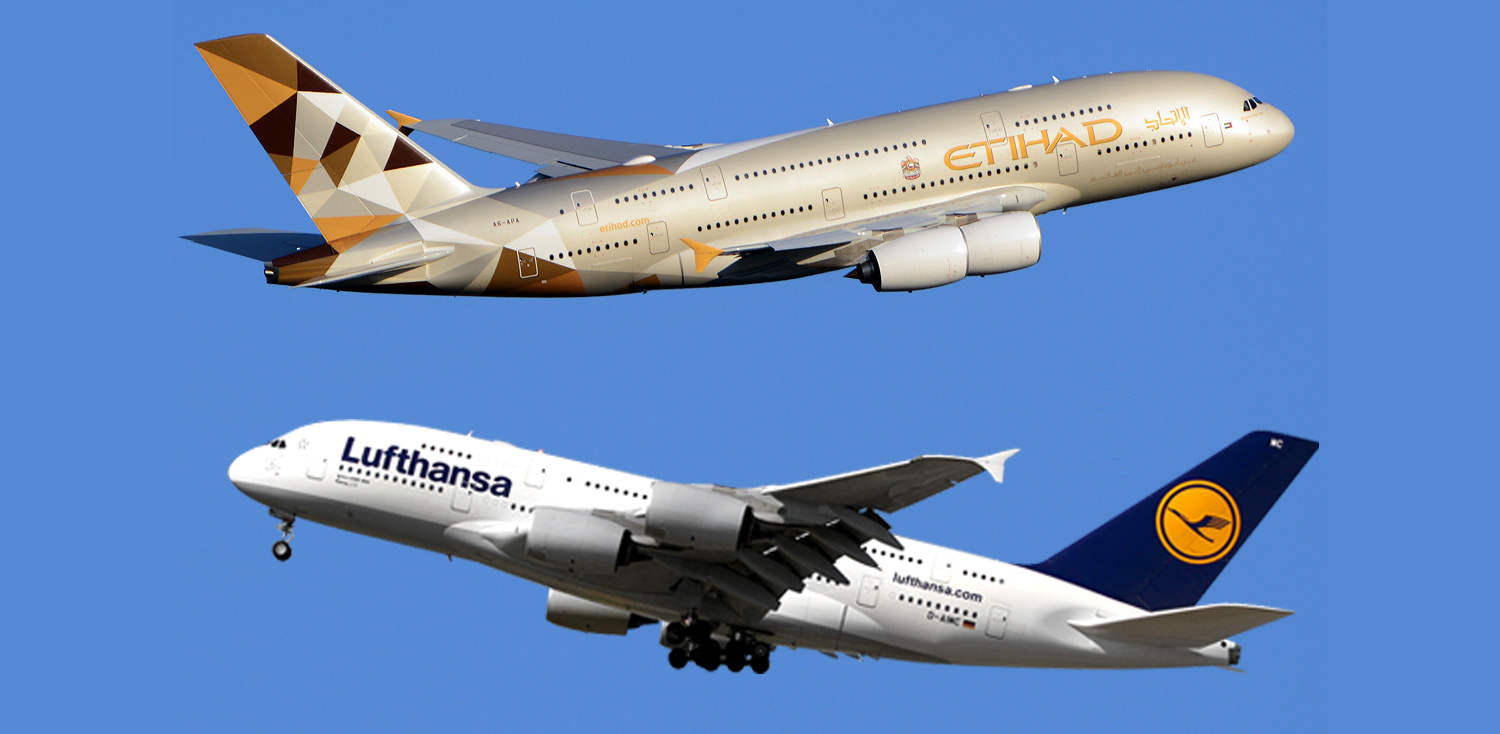Reuters broke news this morning that Etihad is considering up to a 40% stake in Lufthansa with mutual plans for merger under consideration. Stranger things have happened, but I find the merger scenario very unlikely.
Why a Lufthansa – Etihad Merger Makes Sense
First, let’s look at the reasons why a merger might make sense.
1. The two carriers already codeshare
Etihad already has a 29% stake in airberlin and Germany’s beleaguered secondary airline is struggling for survival. To stem massive losses, airberlin is leasing out more than three dozens of its planes to Lufthansa. Part of that leasing is agreement is a new codeshare between Etihad and Lufthansa.
The two airlines will initially code-share on Etihad’s twice-daily flights linking Abu Dhabi with Frankfurt and Munich, and the German carrier’s services connecting Frankfurt with Rio de Janeiro and Bogota, according to a joint statement on Friday. The deal is a by-product of a cut-rate lease for 38 planes with the Persian Gulf carrier’s ailing partner Air Berlin Plc
2. The two carriers are struggling
In the US, fierce competition drove merger: a desire to scale back overcapacity. Arguably, the overlapping markets served by Lufthansa and Etihad are also oversaturated. A merger could begin to scale back capacity in a way that could lead to fare increases and a return to more robust profitability.
3. The concept of hubs in the heart of Europe and Middle East may work
Combined, the two carriers would muster a dominant global route network across the six inhabited continents. Redundant routes between Europe and the Middle East could be slashed and the combined carrier could divide connecting traffic so that each hub is most effectively utilized.
Why a Lufthansa – Etihad Merger Does Not Make Sense
But while I do not dismiss that a merger is possible, I see a few reasons why it will not happen.
1. Labor relations would be impossible to harmonize
The running joke is that for every day of the weeks that ends in -day, someone at Lufthansa is striking. In all seriousness, Lufthansa pilots have struck more than a dozen time over the last 12 months over (my opinion) frankly ridiculous and petty issues.
Can you imagine the uproar if Etihad and Lufthansa starting carving up routes? The two carriers would be required to shed overlap in order to make the merger profitable and that would come at the expense of labor.
With strict German/EU guidelines on the dismissal of workers, any money-saving via cheaper Abu Dhabi-based labor would be virtually impossible to pull off.
2. German politicians would block the merger
Germany has a history of blocking high profile mergers. A proposed merger between the defense firms BAE and EADS was blocked by Germany in 2012. Germany politicians are now rallying to block a merger between Deutsche Boerse and the London Stock Exchange. At the root is issues of national pride, labor protection, and resistance to change. An Etihad – Lufthansa would assuredly rally politicians in a common cause of “no way”.
Foreign ownership controls are not as tight in Germany as in other nations, but that won’t stop politicians from engaging in Delta-style innuendo about Etihad.
3. Etihad’s prior investments have failed to perform
Gary points out that Etihad is already well-invested in several carriers:
- 49% of Air Serbia
- 49% of Alitalia
- 40% of Air Seychelles
- 33% of Darwin Airline (now Etihad Regional)
- 29% of airberlin
- 24% of Jet Airways
- 24% of Virgin Australia
And sadly for Etihad, its return on investment has been poor. It has failed to turn around airberlin and a merger with Lufthansa could create a behemoth that is an even greater money loser.
What the Lufthansa – Etihad Relationship Will Look Like
The more likely outcome will be a strengthened codeshare agreement between the two carriers. While Etihad welcomes this, Lufthansa does it of necessity, hoping that the eventual elimination of airberlin will bolster its chances for sustained health even if it has to “play nice” with the very competition that hurts LH’s bottom line.
Etihad never merged with its prior investment partners and for the reasons discussed above and the drastically different work cultures and fleet emphasis, I’d say the chances of merger are very low.





Leave a Reply